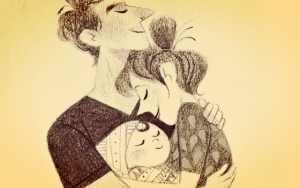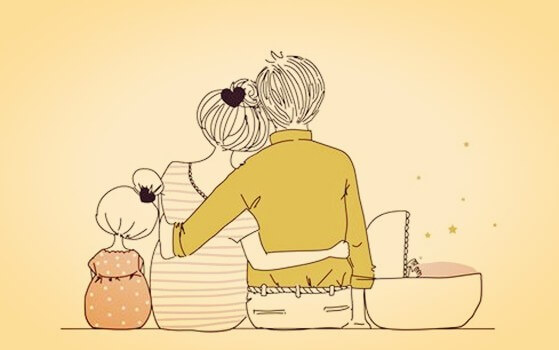I Have Everything I Want, I Can’t Ask for Anything Else from Life


Written and verified by the psychologist Valeria Sabater
Sometimes we let go of the thread of the kite of our dreams, letting them soar as high as the stars. However, most of the time, authentic happiness blossoms a lot closer to the ground.
It blossoms in the garden of life, where it is enough to be close to those who we love the most: our partner and our children.
Albert Einstein said that when it comes to great success, there is a driving force that is more powerful than steam, electricity and atomic energy. That driving force is our will.
It is the force that drives us to fight for what we care about the most every day; those little ones that deserve to be taken care of because of all the real satisfaction they provide us.
“Do not waste your time, it is the matter from which life is formed…”
Caring for and respecting what we love is essential in order to carry out proper parenting and to provide our children with a happy upbringing.
In fact, a very common mistake that many mothers and fathers make is to always dream about perfection.
This simply causes them to collect endless frustrations in the long run. What is worse is that it sometimes causes them to neglect authentic needs.
We don’t need to live a dream life or in an ideal home, nor do we need for our children to go to the best schools or for them to acquire as many skills as soon as possible. We don’t need our children to be the tallest or the most beautiful…
Neither do we need to be the reflection of a perfect family in the eyes of others. We don’t need to be the family that can handle everything flawlessly reaching any goal that is proposed.
Let’s make it clear: there are no perfect families, perfect couples or perfect children. We need to be real people with real and clear priorities and one of those priorities should be happiness.
I dream that my child will be able to become what they want to be

Dreaming is good. Not only is it free, it also allows us to focus on certain objectives. Dreams give us something to fight for.
However, when it comes to a family, where the parents make good partners, it is more enriching to build common dreams where the children are the main protagonists.
- As parents we should avoid planning ahead about what our children’s lives should be like. It isn’t healthy to try to live our frustrated dreams through them. We should provide for them the space to project their own future.
Something we can learn through reading the article “Raising our children while we grow up with them” by Naomi Aldort is that in that little team that is made up of the ones we love at home, the sense of freedom should always prevail.
Freedom should be understood as a principle of personal fulfilment, as an opportunity to develop ourselves in order to continue growing as people.
Freedom allows us to assume new dreams and new challenges while receiving the support of those closest to us.
Suddenly, I realize that I have everything I want

All of a sudden, almost from one day to the next, you realize that you don’t want anything else. The only thing you crave is for nothing to change or for seconds to go by slower so you can enjoy the happiness and balance even more.
You might not have everything you dreamed about in the past. You might not have the best job in the world, leisure time to enjoy yourself as much as you want or several zeros in your bank account.
However, how important is all of that now? Every day you rest your cheek on your pillow knowing that your child is growing happy, healthy and precious.
Every morning you have breakfast with your partner while you look at each other in complicity because you don’t need words to communicate that you’re happy.
You can’t ask for anything more than that. Simple harmony… Being in the best team in the world.
If life only lasts for two days and one of those days is cloudy, I’ll teach my child how to dance in the rain
There will be good days and bad days in your family life. Challenges will arise that at first seem overwhelming.
However, despite all difficulties, economic fluctuations and personal crises, it will continue to be the life that you love for one simple reason: the people you love the most are in it.
One of the most fortunate things that can happen to you in life is to have a happy childhood
- As your children grow older they may also become more demanding. They will want things, demand rights, liberties and even compare themselves with their classmates to discover that they may not have the same clothes, toys or same lifestyles as other families.
- This is a key moment. It is a moment where you should instill in them the knowledge that happiness comes from simplicity. True well-being doesn’t arise from accumulating things, having objects, branded clothes or state-of-the-art technology.
Real well-being comes from self-esteem, an afternoon of games in the park, a trip to the beach with the family, a bike ride with dad, adopting a pet, making new friends, learning how to draw with mom or the knowledge that from day to day, they grow older, safer, freer and more competent.
It is wise to teach our children that life isn’t perfect. It’s not like what story books tell us, regardless, life can still be wonderful.
Sometimes we let go of the thread of the kite of our dreams, letting them soar as high as the stars. However, most of the time, authentic happiness blossoms a lot closer to the ground.
It blossoms in the garden of life, where it is enough to be close to those who we love the most: our partner and our children.
Albert Einstein said that when it comes to great success, there is a driving force that is more powerful than steam, electricity and atomic energy. That driving force is our will.
It is the force that drives us to fight for what we care about the most every day; those little ones that deserve to be taken care of because of all the real satisfaction they provide us.
“Do not waste your time, it is the matter from which life is formed…”
Caring for and respecting what we love is essential in order to carry out proper parenting and to provide our children with a happy upbringing.
In fact, a very common mistake that many mothers and fathers make is to always dream about perfection.
This simply causes them to collect endless frustrations in the long run. What is worse is that it sometimes causes them to neglect authentic needs.
We don’t need to live a dream life or in an ideal home, nor do we need for our children to go to the best schools or for them to acquire as many skills as soon as possible. We don’t need our children to be the tallest or the most beautiful…
Neither do we need to be the reflection of a perfect family in the eyes of others. We don’t need to be the family that can handle everything flawlessly reaching any goal that is proposed.
Let’s make it clear: there are no perfect families, perfect couples or perfect children. We need to be real people with real and clear priorities and one of those priorities should be happiness.
I dream that my child will be able to become what they want to be

Dreaming is good. Not only is it free, it also allows us to focus on certain objectives. Dreams give us something to fight for.
However, when it comes to a family, where the parents make good partners, it is more enriching to build common dreams where the children are the main protagonists.
- As parents we should avoid planning ahead about what our children’s lives should be like. It isn’t healthy to try to live our frustrated dreams through them. We should provide for them the space to project their own future.
Something we can learn through reading the article “Raising our children while we grow up with them” by Naomi Aldort is that in that little team that is made up of the ones we love at home, the sense of freedom should always prevail.
Freedom should be understood as a principle of personal fulfilment, as an opportunity to develop ourselves in order to continue growing as people.
Freedom allows us to assume new dreams and new challenges while receiving the support of those closest to us.
Suddenly, I realize that I have everything I want

All of a sudden, almost from one day to the next, you realize that you don’t want anything else. The only thing you crave is for nothing to change or for seconds to go by slower so you can enjoy the happiness and balance even more.
You might not have everything you dreamed about in the past. You might not have the best job in the world, leisure time to enjoy yourself as much as you want or several zeros in your bank account.
However, how important is all of that now? Every day you rest your cheek on your pillow knowing that your child is growing happy, healthy and precious.
Every morning you have breakfast with your partner while you look at each other in complicity because you don’t need words to communicate that you’re happy.
You can’t ask for anything more than that. Simple harmony… Being in the best team in the world.
If life only lasts for two days and one of those days is cloudy, I’ll teach my child how to dance in the rain
There will be good days and bad days in your family life. Challenges will arise that at first seem overwhelming.
However, despite all difficulties, economic fluctuations and personal crises, it will continue to be the life that you love for one simple reason: the people you love the most are in it.
One of the most fortunate things that can happen to you in life is to have a happy childhood
- As your children grow older they may also become more demanding. They will want things, demand rights, liberties and even compare themselves with their classmates to discover that they may not have the same clothes, toys or same lifestyles as other families.
- This is a key moment. It is a moment where you should instill in them the knowledge that happiness comes from simplicity. True well-being doesn’t arise from accumulating things, having objects, branded clothes or state-of-the-art technology.
Real well-being comes from self-esteem, an afternoon of games in the park, a trip to the beach with the family, a bike ride with dad, adopting a pet, making new friends, learning how to draw with mom or the knowledge that from day to day, they grow older, safer, freer and more competent.
It is wise to teach our children that life isn’t perfect. It’s not like what story books tell us, regardless, life can still be wonderful.
All cited sources were thoroughly reviewed by our team to ensure their quality, reliability, currency, and validity. The bibliography of this article was considered reliable and of academic or scientific accuracy.
- Bowlby, J. (1986). Vínculos afectivos: formación, desarrollo y pérdida. Madrid: Morata.
- Bowlby, J. (1995). Teoría del apego. Lebovici, Weil-HalpernF.
- Garrido-Rojas, L. (2006). Apego, emoción y regulación emocional. Implicaciones para la salud. Revista latinoamericana de psicología, 38(3), 493-507. https://www.redalyc.org/pdf/805/80538304.pdf
- Marrone, M., Diamond, N., Juri, L., & Bleichmar, H. (2001). La teoría del apego: un enfoque actual. Madrid: Psimática.
- Moneta, M. (2003). El Apego. Aspectos clínicos y psicobiológicos de la díada madre-hijo. Santiago: Cuatro Vientos.
This text is provided for informational purposes only and does not replace consultation with a professional. If in doubt, consult your specialist.








